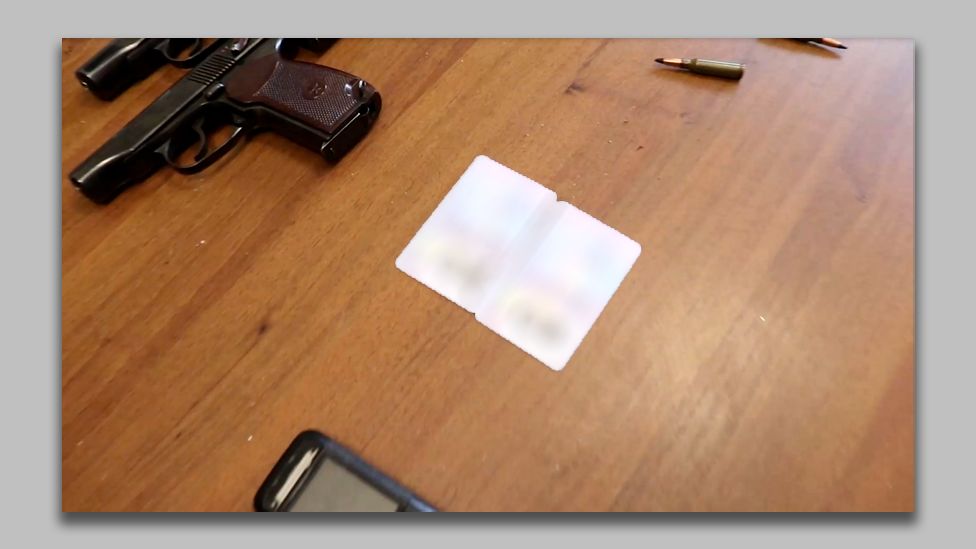War in Ukraine: The making of a new Russian propaganda machine
- Published

The port city of Berdyansk had been occupied by Russian troops for less than a week, but a new pro-Kremlin online media outlet had already moved in.
The company, whose name translates as Southern Front, makes and distributes pro-Vladimir Putin propaganda across YouTube, social media app Telegram, and through a website that targets areas newly under Russian control.
The Southern Front news site posted its first message on day one of the Russian invasion of Ukraine, and now has several correspondents filing stories on a daily basis.
The BBC has found evidence that the site's reporting contains falsehoods and misleading claims.
In early March, Southern Front's correspondent was at the scene in Berdyansk. They reported that Russian soldiers had apparently thwarted an attack, and killed two Moroccan men involved. The reporter alleged the men were working as mercenaries for Ukraine. But it appears elements of the video were staged.
The two Moroccan men identified in the attack were allegedly found with their Ukrainian residency permits still on them.
The BBC tracked down one of the men implicated. According to the report he was dead, but we spoke to him on social media. He requested anonymity but says he was not aware of the Russian report and that he left Ukraine before the invasion and returned to Morocco.
Southern Front regularly posts videos containing unsubstantiated claims.
The majority of the reports claim to show "peaceful life" has been established in occupied areas. The channel often runs stories that justify Russia's invasion.
In one video package, a correspondent reports from a library where she says she found numerous examples of books containing "Nazi symbols". No evidence is seen on screen. The books that do appear on camera include works by contemporary Ukrainian writers about genuine historical events, such as the battle of Ilovaisk.
"Southern Front is likely to be part of the wider Russian strategy to establish control over the occupied territories of Ukraine," says Julia Smirnova, an analyst at the Institute for Strategic Dialogue.
The company and its social media channels are portraying the Russian occupation in the southern regions of Ukraine as a "liberation", and Russian forces as "protectors", says Ms Smirnova.
Who's behind Southern Front?
Southern Front's first message on Telegram to its small audience of 25 subscribers on the day of the invasion said: "Vladimir Putin announced the start of a special operation to demilitarise and de-Nazify the territory of Ukraine!"
Three months into the occupation, its audience has now grown to 23,000.
A website was registered a day after the invasion started. Initially using a Russian server from St Petersburg, it then moved to the American provider Cloudflare, which allows a site to hide the identity of its owner.
The channel produces a regular news service fronted by young, apparently amateur presenters from annexed Crimea or self-declared separatist republics. Ukrainian news sources have been largely cut off.
One of the presenters contacted by BBC Russian said they worked for free, and didn't know who funded the operations.
We also asked Southern Front about the ownership, but did not receive a reply.
But it does appear an influential organisation with ties to the Russian government is hosting Southern Front's content.
After researching dozens of videos, we noticed some clues as to who might be behind the shadowy media organisation.
Many of them were recorded in a conference room displaying the logo of the Russia-Donbas Integration Committee, which suggests this organisation's premises are used to film. The Crimea-based committee's mission, listed on its website, is to build economic and humanitarian ties with the annexed Crimea and the pro-Russian separatist republics in the Donbas.
The leaders of these self-proclaimed republics in eastern Ukraine have key roles in the organisation. The co-ordinator is Andrei Kozenko — a former Russian MP, currently under US and EU sanctions.
Southern Front's content reaches far beyond its website.
A network of like-minded Telegram accounts covering occupied cities often publishes its material.
Collectively, these channels now have more than 80,000 subscribers, although our research shows at least one-third of these were probably paid for to artificially inflate the audience. In three channels the number of followers jumped by more than 10,000 in an hour overnight on 29 March, according to analysis of TG Stat, which tracks Telegram data.
Despite the relatively small following on social media, Southern Front has been boosted by influential accounts, including a pro-Russian blogger with more than 650,000 followers, and by pro-Kremlin media such as Moskovsky Komsomolets - a Moscow-based newspaper found in most post-Soviet countries.
But the fightback has started. Recently pro-Ukrainian activists hacked Southern Front's website with a message about Kherson, which the region's new rulers say they want to be annexed by Russia.
One of the posts warned that any individuals involved in a so-called referendum on the future of the region will be punished by Ukraine.
It said: "Welcome to Hell!!!"
Despite the attack, the site was up and running again shortly afterwards.
There are worrying signs for residents if the project establishes itself. After nearby Crimea was annexed in 2014, independent media outlets were expelled, says Ms Smirnova.
"In southern Ukraine, Russian authorities are likely to follow a similar path by threatening and arresting independent journalists, silencing independent media outlets and replacing them with propaganda channels."
Additional reporting by Samia Hosny and Olga Robinson, BBC Monitoring.